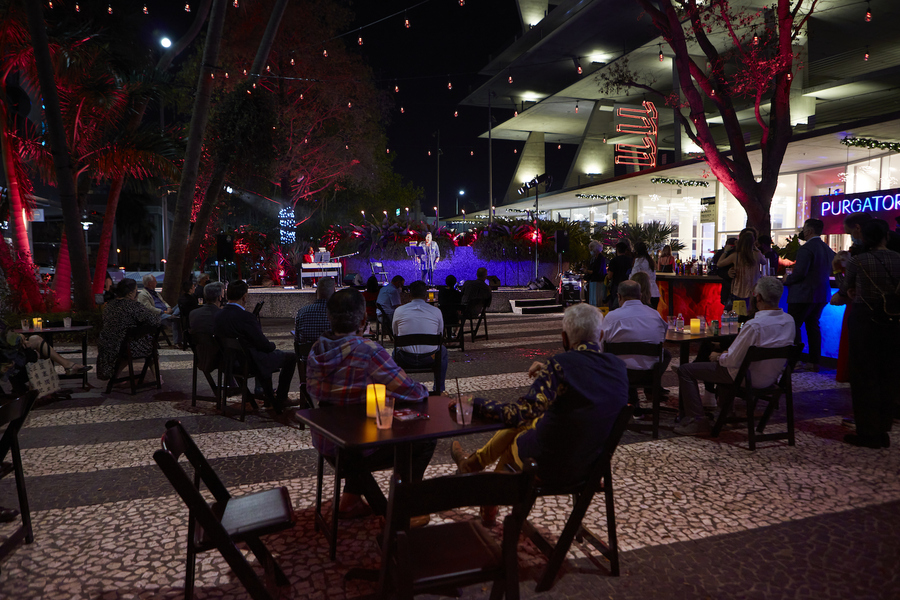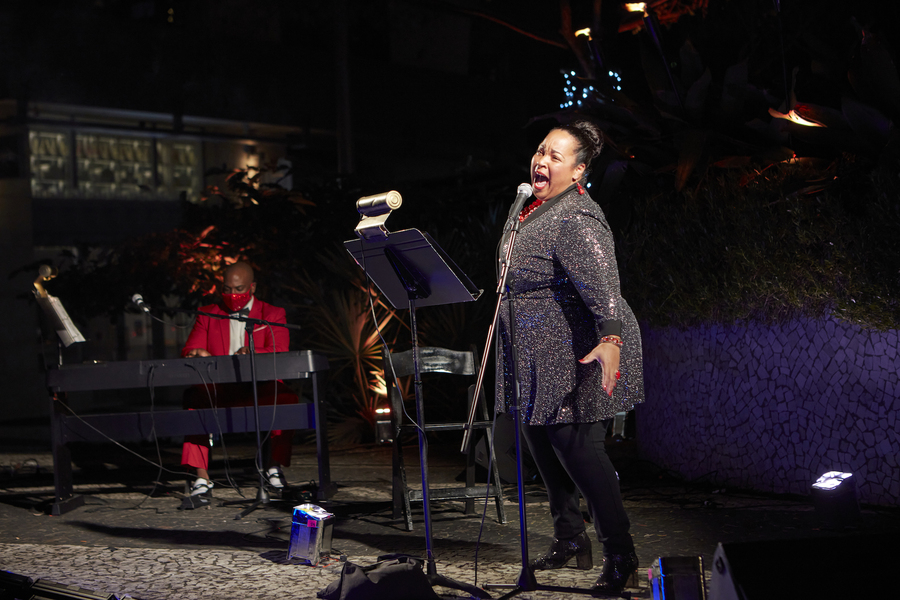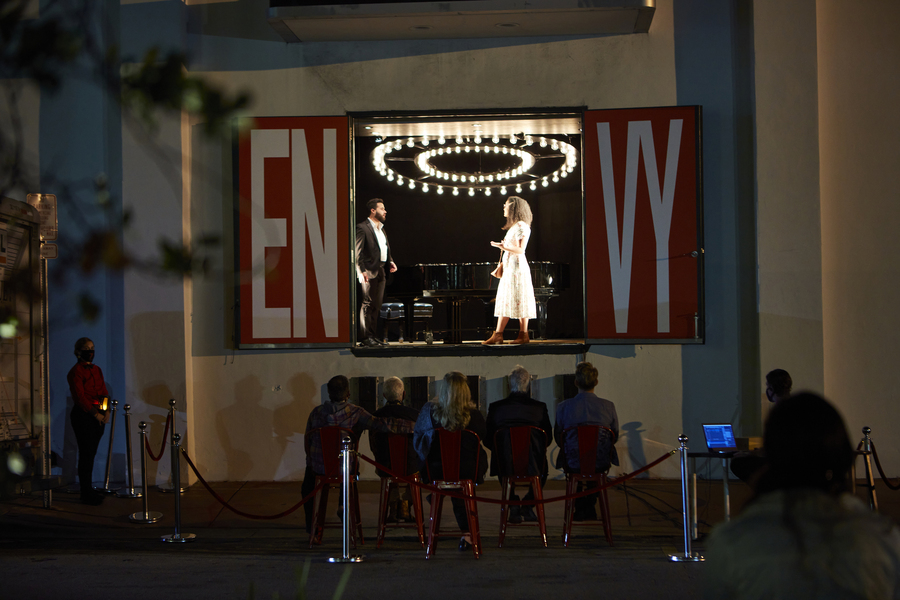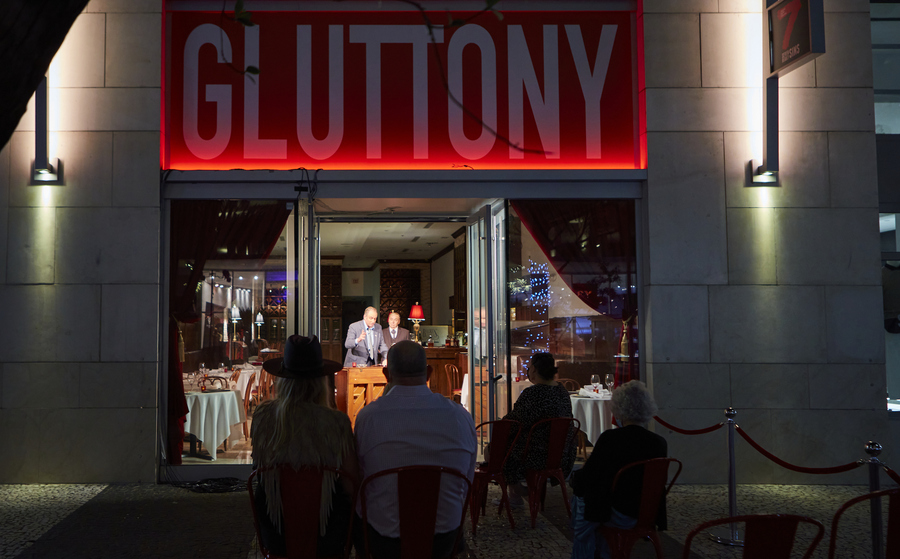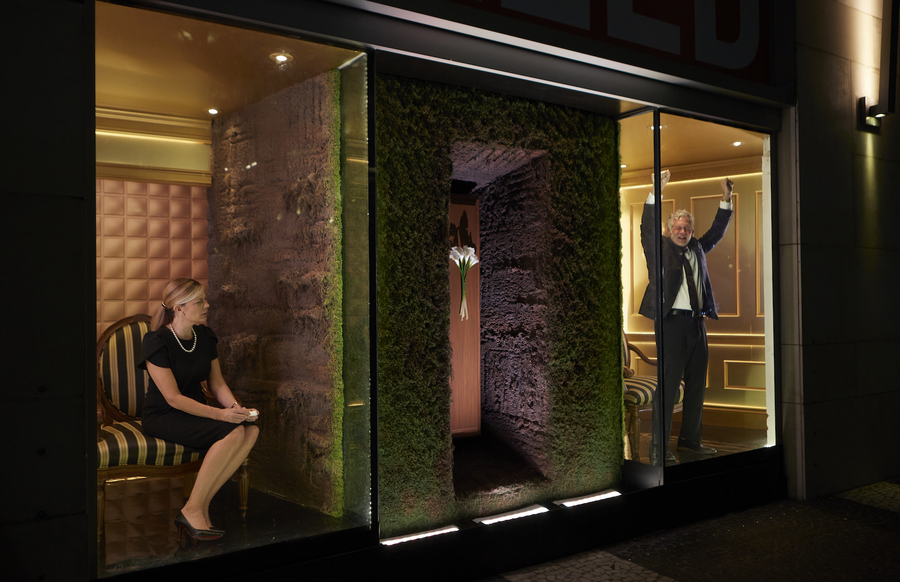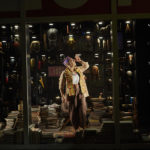After the pandemic shut down the world premiere of Aurin Squire’s Louis Armstrong musical A Wonderful World on the eve of its March 14 opening, while indoor theatre performances were put on a months-long hold, Miami New Drama artistic director Michel Hausmann would wander up and down Miami Beach’s Lincoln Road trying to put together pieces of a puzzle: How could live theatre be brought back safely?
Hausmann’s solution, a dream-made-real with the help of 100 or so collaborators, is Seven Deadly Sins, a $500,000 production that’s running through Jan. 17, mainly in storefronts along the 1100 block of the pedestrian Lincoln Road Mall, one block west of the company’s home at the Colony Theatre. With performers behind glass and masked theatregoers sitting outside in socially distanced groups of 12 under South Florida’s balmy December skies, a show designed to be as pandemic-safe as possible is now selling out.
“Theatre has taken place even at the most horrible moments of humanity, when it was one last thing that was raw and true,” says Hausmann (he/him), who cofounded Miami New Drama with another Venezuela-born artist, playwright-director Moisés Kaufman. “There has always been an idea that theatre could be this dangerous thing. But you contrast that with knowing that doing it might lead to people getting sick or dying, ‘dangerous’ not in an ideological way but in terms of the virus. We had to figure out how to balance those notions: respecting the legacy of our theatre ancestors but being responsible to theatregoers.”
Having immersed himself in the work of Thornton Wilder when he staged a new English-Spanish-Creole version of Our Town in 2017, Hausmann recalled the playwright’s seven one-acts, themed around the seven deadly sins, as well as a 1974 Venezuelan production of Spanish-language plays focusing on greed, wrath, lust, gluttony, sloth, pride, and envy. So he commissioned seven award-winning playwrights—four men and three women, five of them Latinx writers and two Black—to craft 10-minute plays, each about a particular sin. Pulitzer winner Nilo Cruz wrote “Amsterdam Latitudes,” a piece about lust; Dael Orlandersmith contributed the wrath-themed “Memories in the Blood”; Carmen Peláez wrote “Strapped,” about pride; Hilary Bettis focused on envy in “andre and erica[CQ]”; Rogelio Martinez built the gluttony-themed “Itsy Bitsy Spider” around a still power-hungry Richard M. Nixon; Squire examined sloth in “Blackfish,” and Kaufman probed sibling greed in “All I Want Is Everything!”
Creating theatre that would be a spectacle but still have dramatic heft, while just getting the shows up and running, became the challenging puzzle pieces. Hausmann and managing director Nicholas Richberg (he/him) secured the political good will of Miami Beach Mayor Dan Gelber, who attended the Dec. 5 opening night and spoke about the many ways the arts had become a vital driver for his city.
Timothy Schmand, executive director of the Lincoln Road Business Improvement District, also became a supporter, as did the two landlords whose vacant storefronts became six of Miami New Drama’s “stages” (the seventh, for Bettis’s play, takes place just inside the Colony Theatre loading dock, a stand-in for a space at Carnegie Hall). “Our goal was to activate that block, even when the shows aren’t running. It’s a public art installation,” Richberg says.
He and general manager Jessica Kaschube undertook the back-and-forth negotiations with Actors’ Equity that would allow the union’s members to work in the production.
“Equity’s whole system was set up with the idea that theatre is what you and I know as traditional theatre, with the audience and actors sharing air,” Hausmann says. “We are facing a disruption of theatre. Adaptation of the traditional model necessitates a change in the paradigm…Equity created brilliant safety protocols, but we weren’t doing that kind of theatre.”
Says Richberg, “All the guidelines assume the cast is on a singular stage. There were no guidelines to address the specifics of what we were doing. This is a concept born of the need to protect everyone. From its inception, safety has been primary.”
Eleven actors and the production’s stage manager are on Equity contracts, and Richberg says the union has told him Seven Deadly Sins is the country’s largest professional production since the shutdown. A total of 14 performers, including understudies, are in the cast, and an additional eight “guides” lead each small audience group from one show to the next, ensuring that masks and social distancing remain in place.
As for the actors, Stephen G. Anthony (“Strapped”), Sandi Stock (“Blackfish”) and Peláez (who does Orlandersmith’s “Memories in the Blood”) perform alone. The others are pairs—Jessica Farr and Caleb Scott in Cruz’s “Amsterdam Latitudes,” Mia Matthews and Gerald McCullouch in “All I Want Is Everything!,” Gregg Weiner and Christopher Renshaw in “Itsy Bitsy Spider,” Andhy[CQ] Mendez and Renata Eastlick in “andre and erica”—who agreed to isolate together throughout the run. According to Richberg, “Everyone is ecstatic to be working.”
Each person associated with Seven Deadly Sins gets COVID tests twice a week at minimum, and every actor has a private dressing room behind each of the striking storefront sets, which are the work of designer brothers Christopher Swader and Justin Swader. The “backstage” spaces are regularly disinfected, and once the actors enter them, the crew stays out.
“What the audience sees is a wonderful achievement of artistry and design,” Richberg says. “But there’s an equal achievement behind the scenes.”
The audience, a maximum of 96 per performance, is divided into eight groups (an intermission in which theatregoers listen to a bartender’s tale at a popup outdoor watering hole dubbed Purgatory is part of each group’s rotation). So that means that actors perform their shows as many as 16 times on two-performance days.
One of Hausmann’s biggest worries going in was sound. Though any Lincoln Road passerby could see the actors, how would ticketholders be able to hear the dialogue? Designer Matt Corey solved the problem by putting a wireless receiver on each audience seat. Theatregoers get souvenir earbuds in a branded case to plug in at every stop, at a cost of $1.45 each to Miami New Drama. “We buy in bulk,” Richberg says with a laugh.
Seven Deadly Sins has become an after-dark event, with singer Kareema Khouri belting “Fever” and “Sinnerman” before the show, as well as the new post-show number “Sin for Sale,” accompanied by musical director Wilkie Ferguson, who’s dressed in devilish red. Because of the cost of the production and the limited audience size, Seven Deadly Sins isn’t going to boost the not-for-profit company’s bottom line, though selling out the six weekly performances does cover the running costs.
But theatrical achievements are measured in myriad ways, and this one has led to seven new works by significant playwrights, enthusiastic reviews, and jobs for multiple artists. It is both a fresh demonstration of the engaging power of live theater and a non-Zoom bridge from playhouses with ghost lights to packed theatres alive with art.
Miami New Drama’s Seven Deadly Sins plays in the 1100 block of Lincoln Road, Miami Beach, through Jan. 17; 7:30 p.m. Thursday, 6:30 and 9:30 p.m. Friday-Saturday, 6:30 p.m. Sunday; tickets cost $60 and $75 (pick up admission wrist bands at the Colony Theatre box office, 1040 Lincoln Rd., Miami Beach); 305-674-1040 or www.miaminewdrama.org.
Christine Dolen (she/her), the Miami Herald’s theatre critic from 1979 to 2015, is a theater critic and arts writer for ArtburstMiami.com.


